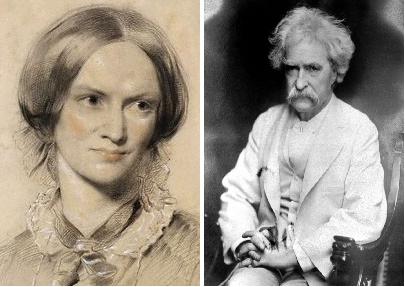
My fellow Austenites, you may have seen that there’s a new Jane Eyre movie out. I can’t honestly say I’ve seen the movie, though at least, unlike some reviewers, I’ve read the book. What I did see was this article from the Washington Post, which neatly pits the title “Jane Eyre Movies Rekindles Austen vs Bronte, the Battle of the Bonnets” against the plaintive cry of “can’t we all just get along?!” Way to play both sides against the middle, Monica Hesse!
It’s been noted that Ms. Hesse’s pacifistic tendencies sound a little ironic after 1 1/2 pages of warmongering, but I do think she has a point. We can like more than one female author at a time. Even more than one English 19th century female author. Just because Charlotte Brontë talked smack about Jane Austen doesn’t mean we have to pit Team Brontë against Team Austen for all eternity. Mark Twain talked smack about Miss Austen too, but you don’t hold a grudge against him, do you? (at least until now . . . 😉 ) Partly, I think, it’s that Austenites SO WISH Jane had had a chance to return fire. What would she have said about Charlotte? Minds can be devoured by this thought! We want to say it for her, something, anything!, but none of us are Jane Austen, alas, so we really can’t.
I’m really of many different minds on this topic.
- Of course we can like both Austen and Brontë if we want, and George Eliot too! It’s probably less weird than liking both Oscar Wilde and J.R.R. Tolkien (which I do).
- But it’s fun to get into literary fisticuffs with the ladies and gentlemen of Team Brontë. People caring passionately about literature, especially without killing each other, how cool is that?! (Just ask Jasper Fforde.)
- On the other hand, if the moichendisers want to make Brontë consumerism the new thing and give us a break, it would be a relief. (Jane Eyre party games! Burnination for all!)
- Clearly, this means that in addition to taking Action Jane to Chawton and Bath in my upcoming England trip, I’ll have to take her to Haworth as well. To DOMINATE . . . er, see how the other half lives. Yeah, that’s right.
By the way, the moratorium on Jane on Jane mud wrestling in the title of this post does not refer to Jane Austen clones. We reserve all rights to the Jane Austen clone wars. Just so you know.

